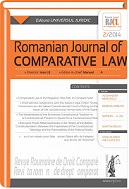Executive power metamorphoses in the history on the balkan constitutionalism: between the imperatives of the constitutional teleology and the potentia
Executive power metamorphoses in the history on the balkan constitutionalism: between the imperatives of the constitutional teleology and the potentia
Author(s): Martin BelovSubject(s): Law, Constitution, Jurisprudence
Published by: Universul Juridic
Keywords: legislative power; executive power; patronage power; financial power; symbolic power; external power; head of state; monarch; government; minister; parliament; symbolic policy; substantial policy; personal policy; constitutionalism; parliamentarianism.
Summary/Abstract: This paper aims at providing comparative historical analysis of the evolution of the executive power institutions in four Balkan states – Serbia, Greece, Romania and Bulgaria. The analysis encompasses the period from the adoption of their first constitutions until World War II. The substantial scope of the research concerns not only the way the status, functions and competences of the monarch, the prime minister, the ministers, the government and other possible executive power institutions are enshrined in the “law in books”. The paper is an attempt at tracking down also the way the office holders of these institutions apply their constitutional powers in the political practice. The analysis combines institutionalism with legal realism as two key methodological approaches. An original concept for separation of powers is applied. It differentiates not only between the three “classical” powers ‐ legislative, executive and judicial, but also between external, financial, patronage and symbolic power. Moreover the distinction between substantial, personal and symbolic policy is underlying the analysis of the institutional design and the performance of the executive power institutions. The paper proposes a goal‐oriented (teleological) analysis of executive power institutions with regard to their constitutional design and, to a lesser extent, also to their practical performance. It is based on a set of aims that constitutions explicitly but much more frequently implicitly impose as imperatives on the design and performance of the institutions. The key goals that the constitutional design of the executive power is supposed to achieve are authority, continuity, efficiency, legality, responsibility and responsiveness. Hence the paper demonstrates whether, how and to what extent the political players achieve the normative constitutional teleology.
Journal: Revista Română de Drept Comparat
- Issue Year: 2014
- Issue No: 02
- Page Range: 299-359
- Page Count: 61
- Content File-PDF

